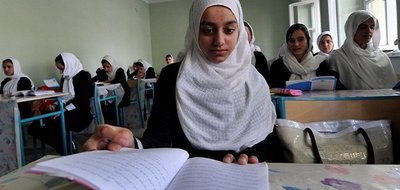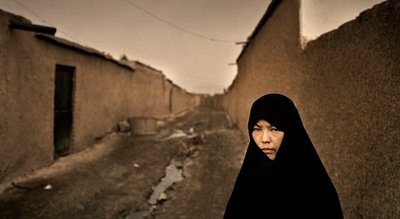More than 170 girls and women became ill at a school in northern Afghanistan after opponents to women’s education allegedly poisoned the school’s water supply, according to local health officials. The incident highlights the dangers women face in the country after American and NATO forces leave.

Periodic attacks occur against girls, teachers and their school buildings, usually in the more conservative south and east of Afghanistan, from where the Taliban draws most support.
Periodic attacks occur against girls, teachers and their school buildings, usually in the more conservative south and east of Afghanistan, from where the Taliban draws most support.
The Afghan girls and women between the ages of 14 and 30 were hospitalized after losing consciousness, becoming dizzy, and vomiting. No deaths were reported.
"Looking at the health condition of these girls, I can definitely say that their water was contaminated by some sort of poison," said Dr. Hafizullah Safi, the provincial health department director, according to CNN. The police questioned the school employees in the small northern town of Rostaq and blamed the act on extremists.
"It is the work of those who are against girls' education and peace and stability in Afghanistan," district administrator Moelam Hussain said.
 In 2010, more than 100 schoolgirls and teachers were sickened in a series of similar poisonings.
Today, more than 3 million Afghan women attend schools and universities in their country and 27 percent of the seats in parliament are reserved for females.
But even though they are no longer banned from the classroom, Afghan girls and women still face discrimination in some places. According to international aid group Oxfam, more than 85 percent of Afghan women said to have suffered from physical, sexual or psychological abuse or been forced into an arranged marriage. Female politicians and social workers face routine threats and intimidation from the Taliban.
In 2010, more than 100 schoolgirls and teachers were sickened in a series of similar poisonings.
Today, more than 3 million Afghan women attend schools and universities in their country and 27 percent of the seats in parliament are reserved for females.
But even though they are no longer banned from the classroom, Afghan girls and women still face discrimination in some places. According to international aid group Oxfam, more than 85 percent of Afghan women said to have suffered from physical, sexual or psychological abuse or been forced into an arranged marriage. Female politicians and social workers face routine threats and intimidation from the Taliban.

Attacks on women in Afghanistan are not new
This was not the first time a girls school was targeted. Last year, hundreds of schoolgirls were hospitalized after falling ill from suspected gas or water poisoning. At the time, local officials also blamed religious extremists for the outbreak. The attacks illustrate the precarious position of women, who have made great strides since the American-led invasion in 2001, but are now nervous about their future after the U.S. and its allies pull most of their troops from the country by the 2014 deadline. Student Voice: Afghan Students Share Life’s Daily Challenges Before the American and allied forces ousted the Islamic fundamentalist government of the Taliban, women were whipped on the streets by religious police if they did not wear a white or blue veil to cover their bodies and those accused of cheating on their husbands were stoned to death at sports stadiums.Reconstruction efforts supported women, but discrimination persists
Many of the American-led reconstruction efforts were aimed at ensuring that women could play a greater role in public life by getting an education, access to health care, the right to vote and other basic human rights.

